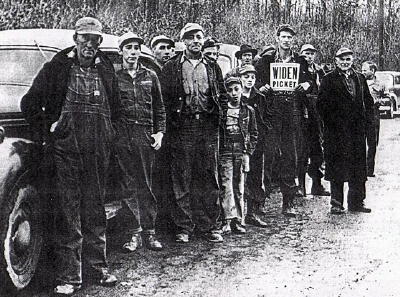
The Widen strike of 1952 brought change
to the coalfields, but not without a price
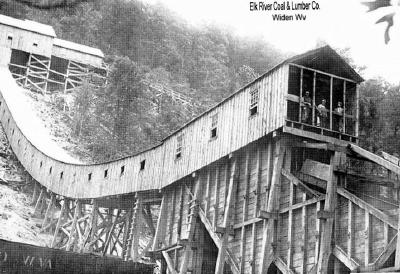
The Widen coal mines were located in one
of the most remote places in Clay County
Editor's Note: The 1952 Widen strike was a turn-around for miners who were locked into servitude to the coal barons, a major boost for unionism and the UMW, moved forward by John L. Lewis.
By Roger Johnson 2007
Photos From Loretta Johnson Samples Collection
My first memory was sitting on the back steps at our half of the
two story duplex owned by the coal company. It was summer in Widen,
Clay County, West Virginia and I was three years old.
The reason I remember this day is because my mother, for the first
time, gave me a jam sandwich with two slices of bread instead of one
slice folded over.
Thirty feet from our back steps was the railroad tracks that hauled the coal from the mine to the tipple. Beyond the tracks the mountain went straight up for as far as my young eyes could see.
The other thing I remember from Widen was there was no color. Everything was gray or dingy brown.
The house we lived in was a double occupancy with a sitting room and
kitchen downstairs and two bedrooms upstairs.
There was a double chimney with a fireplace down and up in both residences. The walls, floors and ceilings were not insulated. There was a double seat outhouse in back of the house. One outhouse for each residence.
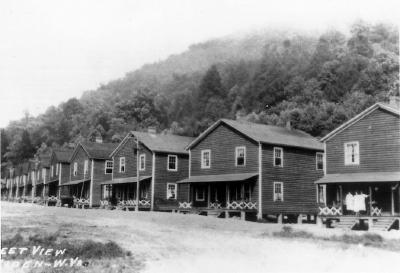
Row upon row of Widen company houses, close to the company store
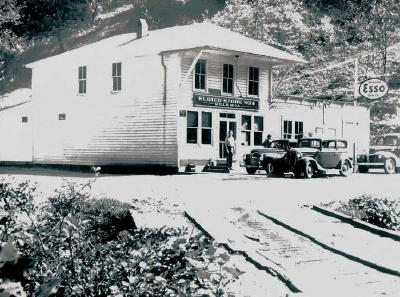
The company store at Dille, where miners used
mandatory script rather that cash from their paychecks
I was born in 1943 in Charleston Memorial Hospital, Charleston. It was a Thursday. That day my Dad had gone to Clarksburg where he was inducted into the United States Army. He fought for the duration on the War in France, Belgium and Germany.
By the time Dad returned from the War in 1945, my mother and I were
living with my Grandmother Minnie Jeffrey Johnson in a little frame
house at Dille. That house was just up the road from the Dille Company Store. One of four the Elk River Coal and Lumber Company owned.
Dad went back to work in the mines at Widen and we eventually moved into a little white house across the creek from where Grandma Johnson lived.
We didn't live there long until we moved down the road to Dille,
to a house up on the bank, up the road from Neuman Butcher's store. I was between four and five years old.
About 1958 we moved over the hill to Morris in Nicholas County. Life
was tough at Morris much of the time. Dad worked at Widen in the mines and there were always layoffs or work stoppages.
He and Uncle Elza Goff were in the strike of '52. I remember them coming home early one day and when someone asked why, they said a rock had fallen on their foot.
I didn't see either limping. They didn't go to work the next day. Then one evening they walked up the hollow, both carrying shotguns.
They didn't come home the next day.
Dad and Elzie had walked to the top of the hill to the road and caught a ride with someone. The UMW had set up a food distribution center at Dille in a block house by the road that goes up to Butcher Cemetery. They had heard that the company men were going to raid the block house and destroy all the supplies the union stocked for the strikers.
While the strikers were gathered, a company man was shot while
driving home from work. I recently heard he was wounded in the neck but survived to old age.
Sometime after midnight, a squad of State Police
raided the union block house. Most of the men scatted into the dark.
Dad later told me he ran up the hill behind the building, lost his
shotgun and got tangled in a barbed wire fence. He said bullets were
whizzing around him like when he was in France. He threw up his
hands and was arrested. Uncle Elzie was caught also. I think about 50 men were arrested.
Dad and Elzie spent six weeks in jail. I heard they
were released when a union lawyer showed the company man was shot with a rifle, not a shotgun.
While Dad was in jail, mom did all she could, but my two sisters and I went hungry several days. One day all we had was a slice of bread fried in bacon grease.
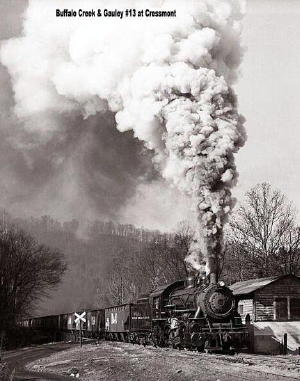
Train after train hauled the coal from the remote
mountains to market, shown a train at Cresmont
After a week or so, mom got to go see dad in jail. She
came home with a Prince Albert tobacco can full of pennies. Probably
about $3. She went to Willie Morris' store and got enough food to
last a couple of days.
Finally, a friend or relative showed up at our house with a bag full
of "commodities".
Commodities was food provided by the state before there was widespread welfare.
They consisted mainly of cheese and powdered milk. I hated the powdered milk but liked the cheese. It was a solid chunk of American cheese about 4 inches by 4 inches and a foot long.
There was tension at school during the strike, each kid reflecting
his parents views. Miss Bailes kept things pretty quiet during school hours but on the way to school and on the way home the scream of "Scab" and "Ginney Wink" could be heard echoing off the mountains.
"Scab" being those miners who chose to work and cross the picket lines. "Ginney Wink" meaning jackass, or stubborn as a mule, referring to the strikers. I never got in a fight over the strike, but I joined the name calling.
Years later Dad bought Uncle Elzie a new 16 gauge pump shotgun to
replace the one he had borrowed and lost during the raid. We didn't
stay at Morris long after that. During the summer he got a job in the mines at Tiaoga, packed the family up and moved to Craigsville, Nicholas County.
Read other Clay County stories using SEARCH for Widen or Dille
| 


